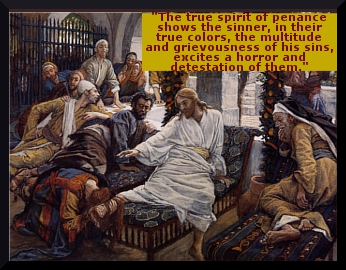Someone, not too long ago, commented on FB, that the faithful had a right to the Sacraments. Of course this is not true, but it is understandable that the faithful almost unconsciously have imbibed this heretical notion floating around since after Vatican II.
Recall that it was in the opening speech of VII that Pope John XXII stated that “Nowadays, however, the Spouse of Christ prefers to make use of the medicine of mercy”. Mercy – one hears so much about Mercy, that the grievousness of sin and the punishments due to it, have been largely forgotten. It is almost as if God owes his creatures the eternal paradise!
Citing Session 14, Chap. 2, of the Council of Trent, the Church teaches that if the faithful should have the misfortune of losing sanctifying grace through the committing of mortal sin, “we can by no means acquire the same newness and integrity by the sacrament of penance, without great weeping and labors upon our part, the divine justice so requiring it.”
The Manual of the Holy Catholic Church (1906) teaches us the correct and infallible doctrine – for then, for now, and for all future posterity:
“[C}onsidering the dreadful evil of sin, when committed after Baptism, a sinner, by committing it, forfeits all title to mercy, and God could, without the least injustice, condemn him to the eternal punishment his sins deserve, treating him with the same rigor of justice with which he treated the fallen angels…
“He is still willing, through the merits of Christ, to receive us into mercy, but it is upon condition that we endeavor to satisfy his justice also….he positively requires that justice and mercy should go together, and be no more separated.
“[H]e absolutely demands that, by penitential works, we punish ourselves for our shocking ingratitude, and satisfy the divine justice for the abuse of his mercy. So that the effect of mercy here is not to free us entirely from the punishment, as in baptism, but to change the eternal punishment which we deserve, and which we cannot undergo but to our utter destruction, into a temporal punishment which we can perform, and the performance of which is attended with the greatest advantages to the soul.”
Lest all of this seem frightening, recall that our Lady of Fatima said that the penance God exacts of us, is faithful compliance with our daily duty. This of course, entails doing it while in a state of grace after having confessed mortal sins, and avoiding the occasions of sin which led one to forsake God’s love in the first place.
 “I am the Lady of the Rosary, I have come to warn the faithful to amend their lives and ask for pardon for their sins. They must not offend Our Lord any more, for He is already too grievously offended by the sins of men.”
“I am the Lady of the Rosary, I have come to warn the faithful to amend their lives and ask for pardon for their sins. They must not offend Our Lord any more, for He is already too grievously offended by the sins of men.”
– Our Lady of Fatima



